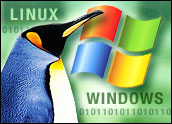
Microsoft will stop security support for Windows XP this coming April, meaning that more than a few remaining users of the long-standing OS need to come up with an alternative plan.
Almost a third of desktop computers still run Windows XP, according to Net Applications. Perhaps even more concerning, more than 15 percent of midsize and large enterprises will still have Windows XP running on at least 10 percent of their PCs after Microsoft support ends, Gartner estimates.
To avoid critical security and usage issues, current XP users need to undergo some massive systems migrations.
‘You Might as Well Switch to Linux’
Transitions like that are never quick or easy, even if it’s simply to a newer version of the same operating system. Given how much has changed along the way to Microsoft’s Windows 8, that’s more certain than ever to be true this time around.
At the same time, there is an increasingly compelling alternative some say may offer a smoother and easier transition.
It’s robust, it’s secure, it’s compatible with older hardware, and it’s free. Its name, of course, is Linux.
“Since you are going to have to learn a new way of doing things with Windows 8.1, you might as well switch to Linux, which is known for being safe and secure,” Bill Reynolds, founder and owner of PCLinuxOS, told LinuxInsider.
‘A Viable Alternative’
Indeed, in migrating from XP, there has been a large push for Windows 7 and Windows 8, but also Linux desktop solutions, Deepak Kumar, the founder and CTO of Adaptiva, told LinuxInsider. Linux is a viable alternative to Windows, and many corporations may find it more stable as it is a long-standing platform. [*Correction – Jan. 14, 2014]
Kumar sees potential for increased adoption of Linux now that XP is retiring, but it will happen slowly because of how entrenched the Windows platform is in the business world, he said. Moving to Linux would require a different set of skills in employees, system administrators and IT professionals, Kumar pointed out.
One of the biggest stumbling blocks on the way to unfettered adoption of Linux by Windows XP users is the upgrade path that encourages customers to stay with the Windows platform. It is already in place — good or bad — while the Linux OS is not always marketed as an option.
“If Windows 7 was not still going to be available, then the Linux OS might be able to gain a foothold,” Mark Lewandowski, founder of Riverfront Technology Consulting, told LinuxInsider.
“I think it will be hard for Linux to break into the workplace,” Lewandowski added. “One issue is the talent pool; another is that support for Linux across the high end in enterprise is lacking.”
Familiarity Trumps Usability
Linux may have lost at least some of its appeal for migrating Windows users when Microsoft agreed to user interface concessions in its latest Windows 8.1 release, according to Norman Rosenthal, principal and owner of Sterling Rose Consulting.
Rosenthal now sees a loss of interest in migrating to Linux among SMBs as a result.
“As long as users can continue to click on a button to put a semblance of the Windows 7 Start menu, users will be hesitant to move to another platform that will require them to learn a new interface,” he told LinuxInsider.
The current situation mirrors what happened in the 1990s when Apple was trying to break into the business arena with the Macintosh platform, Rosenthal pointed out. Back then, specifically, people were reluctant to switch to Macs even though the platform had its own graphical interface.
Regarding Linux, “the hesitancy involves skepticism for the whole arena of what is going on with technology today,” said Rosenthal. “Windows remains their comfort level in that regard.”
Not Just One OS
The two biggest impediments that the Linux OS faces as an alternative to Windows XP are the supply chain and a lack of marketing, Mason Uyeda, senior director of technical marketing for end-user computing at VMware, told LinuxInsider.
“How do you get all support to a common platform?” Uyeda asked. “Linux has too many distros. So the Linux supply chain issue needs to be solved first.”
Users need assurance that everything that needs to be connected will be, for example. Right now, however, there are no major OEMs supplying Linux drivers. Linux also has some issues on the virtual machine level, which is a critical concern for extended enterprise use, noted Uyeda.
No Easy Solution
Users could eventually overcome their misconceptions about Linux’s user interface, but an overriding issue remains the reality that businesses still thrive on Windows programs, according to Uyeda.
“You can not just plug in a Linux desktop replacement,” he asserted. “Even if you solve the Linux desktop problems by figuring out the distro differences, you still have the obstacle of applications to use.”
Most businesses still on XP have now worked up plans to move to Windows 7 or Windows 8, and both Windows options are surprisingly tolerant of older hardware and will likely work on most machines, according to Al Hilwa, program director for applications development software at IDC.
“Will there be difficulty to support hardware with more modern Windows releases? I expect the answer is ‘yes,’ but configuring Linux is not a day at the beach either,” Hilwa concluded. “I think there is an after-market for older PCs, and most will end up either running XP unsupported or be converted to run Linux.”
*ECT News Network editor’s note – Jan. 14, 2014: Our original published version of this story directly quoted Deepak Kumar as saying, “in migrating from XP, there has been a large push for Windows 7 and Windows 8, but also Linux desktop solutions. Linux is a viable alternative to Windows, and many corporations may find it more stable as it is a long-standing platform.” In fact, Adaptiva’s PR rep, Katie Beason, provided the comment to LinuxInsider in the context of “offering some insights from Deepak Kumar,” which were not intended to be direct quotes.






















































Nope, hello Windows 7 or Mac. I did open source for years and years. Still great choice for servers but for the desktop, its adoption will remain flat. Too much bickering on the open source front. No unification of standards, tools & apps as they still look/feel disjointed.
The more web solutions from thick client apps, the more I see Mac making huge strides.
My company supports Windows, Linux, and Mac OS. We have never had a problem supporting other rare operating systems, since there is usually a manual; and if you know how computers work, the type of OS installed is of little consequence to the administration of the system.
The issue of switching to GNU/Linux hinges on the skills available at the company that is switching; or the question of what they are willing to pay for. Most of the support staff at small to mid-sized companies don’t know anything outside the Windows World (sad). So they have quite a bit of catching up to do if they are going to support any Unix like deployment.
As far as applications are concerned: You can either install a Open Source version of the Windows software that is being used. In the small amount of cases that you need the windows version, you can create a server and emulate the windows system on it; link it to the desktop, and run the VM seamlessly, so the user doesn’t notice anything different. There should be a plan from the start to migrate the functionality to a Open Source application/database – so that this is not a future concern. In dream world a system admin would be able to do the development (scripting) to handle such a project; though realistically you are not going to find a lot of people in these positions that have any such skills or aspirations. In this way you are basically creating a terminal system for the employee to use, and taking the need to work within the limitations of the OS out of the picture.
I don’t understand the issue of distro differences (other than those that have been previously stated): Since it really doesn’t matter what distro you are using as far as compatibility between machines/applications go. The only reason you want to have a cohesive distro choice would relate to general administration; ie. it is much easier to use the same package manager across the board (though you could use a program like salt and the salt stack, and then it ceases to matter.)
Familiarity will always be an issue as long as people really don’t understand how a computer works, or understand how programs work that are outside of the Windows ecosystem. Though GNU/Linux now has more GUI options than it has ever had, practicality suggests that you should administrate the system though the command line and by directly typing your own custom version of config files; it is no longer necessary and should lend itself nicely to the quiche eating Windows system administrators that would have to support it for most companies.
I am not sure why it is seen as acceptable for one applying for a job as a System_Administrator/IT_Manger to not know basic and built in Unix commands and system structure. This seems like a basic computing skill that anyone at such a level should posses. So I guess I would say that the main thing holding back the spread of the GNU/Linux desktop operating system is lack of skills in the computing community overall. The skilled person that wants to get work done uses nothing but GNU/Linux or other Unix like operating systems; the quiche eaters will continue to use anything that spoon feeds their small brains.
Many businesses providing IT support have already moved their internal support personnel to a gnu/linux desk… IBM is one of those.
In the future more "apps" are going to be hardware and platform independent. Cloud apps and cloud data storage accessed through web interfaces mean that more of the user skills required have nothing whatsoever to do with the platform.
BYOD is becoming more popular with employers. This has of course already happened on college campuses… where most machines are mac notebooks, or gnu/linux notebooks / netbooks. Most younger folks today are not struggling to "learn" new skills… gnu/linux comes very naturally to them.
There is no reason not to switch to gnu/linux /infact, its the best solution at the present time.
On the other hand… if your XP machine is patched, and the hardware keeps running, there is NO reason to stop using it. Keep it behind a fire wall, never trust it, and just use it…
On the other hand… if you want to join the rest of us in the 21st century, then by all means switch to gnu/linux.
Cheers